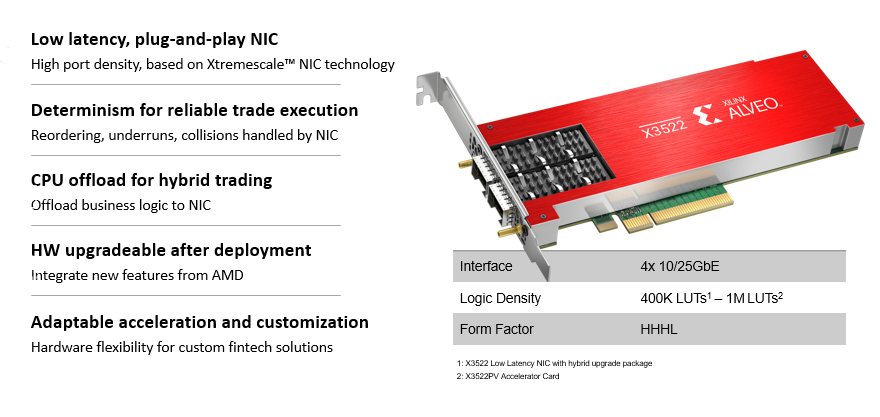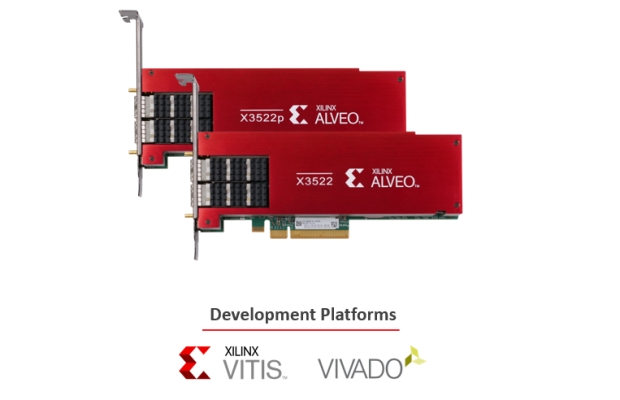The strategy was a brilliant move for AMD to expand the TAM (Total Amount of Market). Lisa Su these days mentions Accelerated computing more often, something that the CEO of Xilinx, Victor Peng, now President-Adaptive & Embedded Computing Group at AMD, used to repeat and pitch. One of the new market opportunities AMD acquired with Xilinx is higher-level access in accelerated computing.
The trading market is all about the low latency trade execution embraced by risk management, which Xilinx mastered a while ago. Back in the middle of 2020, Xilinx broke an electronic trading record with 24.2 nanoseconds courtesy of Raptor FPGA pre-trade risk management.
Leading trading firms, market makers, hedge funds, and exchanges demand low-latency trade execution and risk management for competitive advantage.
The new Alveo™ X3 series are the first AMD network cards designed with screened FPGAs optimized specifically for low-latency trading. The card is in production and shipping now.
Alveo X3 series
The Alveo X3 series offers both turnkey deployment and custom implementation paths for various low-latency trading applications. The portfolio comes in two hardware variants, one of which features an optional software upgrade:
The Alveo X3522 low latency network adapter can serve as a plug-and-play NIC card. It is designed to deliver deterministic response time for reliable trade execution and serving as a natural upgrade from the ubiquitous X2 series NIC. The platform comes with Onload application software support to eliminate latency penalties of standard Linux networking stacks and support other host-based software such as TCPDirect.
The Alveo X3522 card can also operate in hybrid mode via a software upgrade, providing access to FPGA programmable logic. The programmable DNA that AMD acquired with Xilinx can enable future hardware upgrades for the chip that can significantly increase the execution speed of new algorithms. These days algorithms are changing rapidly and bringing future acceleration in software and hardware to platforms, and being able to bring the updates in hardware can further provide a competitive edge.
This enables computational offload to be closer to the wire to accelerate various trading strategies. Algorithm developers can use the Vitis Unified Software Platform to design plugins in C/C++ using hundreds of Vitis library functions and building blocks or create designs from the ground up using Vitis HLS.

The Alveo X3522PV adaptable accelerator card provides a fully hardware-programmable option for solution vendors to develop highly customized fintech applications, enabled by the Vivado Design Suite.
The Alveo X3 series delivers an immediate low latency advantage through turnkey networking IP, state-of-the-art connectivity, and hardware adaptability for evolving use cases and future requirements. At the platform’s foundation is the 16nm Virtex® UltraScale+™ FPGA, making the Alveo X3 series the only FPGA-based Fintech card in a -3 speed grade for both turnkey and custom data paths. The card also features 4x 10/25G ports, doubling that of its X2 series predecessor.
“Electronic trading continues to evolve and the race to the lowest latency trade execution is critical to how financial firms operate,” said Hamid Salehi, director of product marketing, Fintech and Blockchain Technologies, AMD. “The Alveo X3 series brings low latency and adaptive computing onto a single platform to give our customers a competitive advantage for today’s markets and future requirements.
Alveo X3 series provides hardware programmers and ecosystem partners a scalable platform backed by AMD and designed with the future in mind with adaptive computing technology. Among these strategic partners is Orthogone Technologies, a leader in electronic design services and product development.
"Co-developing a solution that combines Orthogone's ultra-low-latency (ULL) FPGA Framework with the AMD Alveo X3 series will give our mutual customers access to a flexible and high-performance FPGA platform for accelerating electronic trading strategies," states Alexandre Raymond, co-founder, and CTO of Orthogone.




